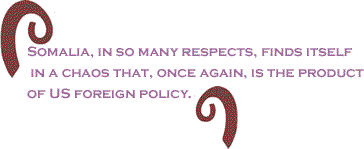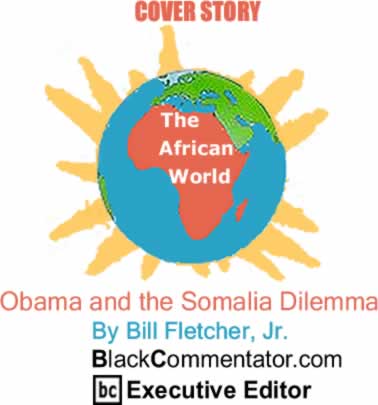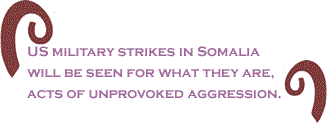
|
|||||||||||||||||||||||

Custom Search
|
|
 |
|
With all of the discussion about the pirating of a US ship off the coast of Somalia, it is possible to overlook a far more important discussion concerning the Horn of Africa. According to the Saturday, April 11th issue of the Washington Post the Obama administration is discussing whether military action should be taken against the Somali right-wing Islamist group known as Al-Shabab. Al-Shabab began as the military wing of the Union of Islamic Courts (UIC), the movement that stabilized and ruled much of Somalia during 2006 (and parts of Somalia prior to that). At the end of 2006 Ethiopia staged a US-inspired invasion of Somalia. The Ethiopians quickly overran the UIC positions and drove them from power, at which point the rootless Transitional National Government was installed. The UIC, however, began a deadly guerrilla campaign against the TNG and their Ethiopian allies. Al-Shabab was one of the instruments of that campaign. In time, however, differences emerged within the UIC and between it and Al-Shabab such that the latter now exists as a largely independent organization. The pretext for the Ethiopian invasion was that the UIC had connections with Al Qaeda. No such ties were ever proven, but the Bush administration used these allegations to support the invasion and to carry out military attacks against UIC and alleged Al Qaeda positions following the Ethiopian invasion. Ethiopia largely withdrew from Somalia at the end of 2008, unable to ever stabilize the situation yet making itself the enemy of the mass of Somalis. In this situation of great instability, Al-Shabab has emerged as a domestic force fighting for power. Elements of the Obama administration and the US military believe that Al-Shabab has ties to the Al Qaeda and, as such, should be subject of military assaults by the USA. Others in the Administration suggest caution since the objectives of Al-Shabab seem to be focused on Somalia (and that ties with Al Qaeda are dubious, at best).
Somalia,
in so many respects, finds itself in a chaos that, once again, is
the product of US foreign policy. The dictatorial regime of former
dictator Siad Barre (overthrown in 1991) was a major ally of the
USA, despite all evidence that the original reform aims of Barre’s
regime had US military strikes against Al-Shabab will, if anything, further inflame the situation. Consider what is transpiring in Pakistan at this moment. US military strikes at alleged terrorist bases WITHIN Pakistan, which more often than not result in civilian casualties, not only create great hostility to the USA, but further destabilize the political situation in an already fragile Pakistan. Rather than strengthening the Pakistani government, US military operations discredit the Pakistani government. US military strikes in Somalia will settle any questions that may exist as to the objectives of the USA, at least from the standpoint of the Somali people. Since there is no evidence of Al Shabab actions targeting the USA, US military actions against Al Shabab will be seen for what they are, acts of unprovoked aggression.
Obama has one chance to get this right. Impetuous action will more than likely produce just the enemies the USA so fears, not to mention unhinge the region. BlackCommentator.com
Executive Editor, Bill Fletcher, Jr., is a Senior Scholar with the
Institute for Policy Studies,
the immediate past president of TransAfrica Forum and co-author of, Solidarity Divided: The Crisis in Organized Labor and a New Path
toward Social Justice |
|
Any BlackCommentator.com article may be re-printed so long as it is re-printed in its entirety and full credit given to the author and www.BlackCommentator.com. If the re-print is on the Internet we additionally request a link back to the original piece on our Website. Your comments are always welcome. eMail re-print notice
If you send us an eMail message we may publish all or part of it, unless you tell us it is not for publication. You may also request that we withhold your name. Thank you very much for your readership. |
|
| |
|
| April
16 , 2009 Issue 320 |
|
| Executive Editor: Bill Fletcher, Jr. |
| Managing Editor: Nancy Littlefield |
| Publisher: Peter Gamble |
| Est. April 5, 2002 |
Printer Friendly Version
in resizeable plain
text format or pdf
format. |
| Frequently Asked Questions |
 |

|
 |
 |
 |
| |
| |






































